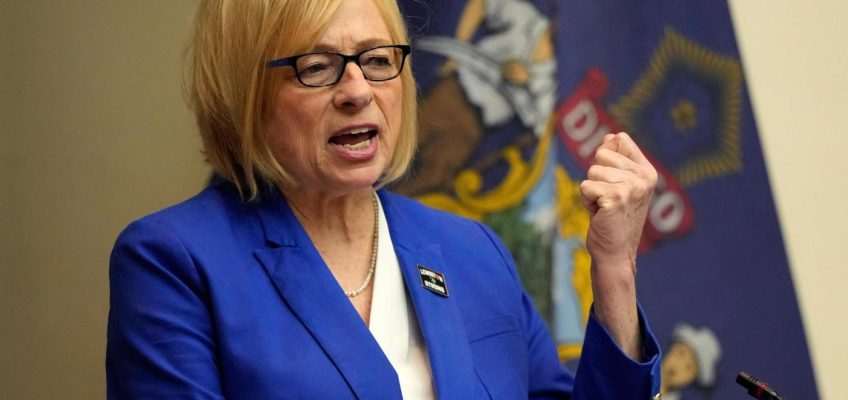It’s a testament to the NHL’s three-point standings system that the Wild were able to just about reverse the narrative on their season Sunday with a big overtime victory over the Dallas Stars at Xcel Energy Center.
After hemorrhaging points for nearly two weeks and playing without two of its best forwards for longer, Minnesota appeared to be stumbling toward playoff elimination (0-4-2) with the season winding down.
But the Wild answered the bell on Sunday, beating their traditional Central Division nemesis without forwards Kirill Kaprizov and Joel Eriksson Ek, and blue line anchor Jake Middleton, 3-2, on an OT power play.
Back to six points up on closest competitor Calgary for the eighth and final Western Conference playoff spot with four regular-season games remaining, the Wild appear all but a lock to return to postseason play after missing the playoffs last season.
In the immediate wake of Marco Rossi’s game-winning deflection of a typically preternatural feed from Mats Zuccarello — and with four regular-season games remaining against teams currently out of playoff position — confidence in the Wild dressing room was high.
“It’s been a grind, but we’re excited we’re still in the driver’s seat,” said veteran winger Marcus Foligno, who scored the Wild’s second goal. “Our fate’s in our hands.”
Pro Hockey Reference had the Wild’s postseason chances at 92.3 percent on Monday, and Playoffstatus.com had it at 96 percent, which seems about as good as it can get for a team that has been playing without two of its best forwards for months, and now has one of its best defenseman day to day after going head-first into the boards last Friday.
To be any good this season, the Wild had to avoid injuries; instead, it couldn’t have been much worse. They haven’t had Kaprizov, a Hart Trophy candidate before we went down, since early January. Eriksson Ek hasn’t played since he returned from the Four Nations Faceoff in mid-February, and defenseman Jonas Brodin on and off all season.
Fortunately, they were really good when the team was intact.
Minnesota finishes the regular season with four games in seven days starting Wednesday against San Jose at the X, and if the Wild close out a playoff spot, John Hynes should be a finalist for the Jack Adams Award. What they do there will depend largely on whether Kaprizov and/or Eriksson Ek will be available. Their presences dictate the team’s ability to ice two legitimate scoring lines, and whether they’re the No. 7 or No. 8 seed, the Wild will play either Winnipeg (0-3-0) or Dallas (2-2-0) in the first round.
The Wild were off Monday and it’s assumed Kaprizov will practice with the team Tuesday at TRIA Rink, but the Wild have been sensitive about the superstar’s status since they acknowledged in January that the left wing needed surgery — he had it on Jan. 31 — and Hynes has understandably given up estimating on either player, both of whom are skating but still on injured reserve.
“You know why I don’t like to give timelines; because it changes every day,” he said Sunday. “I truly do not have one. I can’t give you one.”
This has been the burning question for months now, and it will remain until one or both are back.
One wonders what has been going through Kaprizov’s mind the past few months. Has he watched the team flounder without him and die a little inside because he can’t help? Or does he wonder if the Wild will ever be deep enough that the team’s fortunes won’t completely rely on his health?
Kaprizov has one more year on a deal that will pay him $45 million over five years but he can sign an extension this summer. Minnesota will get a $22 million windfall they can use to get Kaprizov some help in July, and what general manager Bill Guerin does with it will likely be the biggest factor in whether the Russian sniper stays or looks elsewhere for his Stanley Cup.
Kaprizov will get handsomely wherever he goes. The successful suitor will be the one that convinces him he will play in a lot of playoff games, for big stakes, for the next several years.
Related Articles
Jake Middleton latest Wild regular sidelined by injury
Wild GM Bill Guerin: ‘It’s up to the guys in that locker room’
Wild return to NHL duty still missing their best player
Wild about to receive a salary cap windfall of roughly $22 million
Wild shutting Kirill Kaprizov down again




